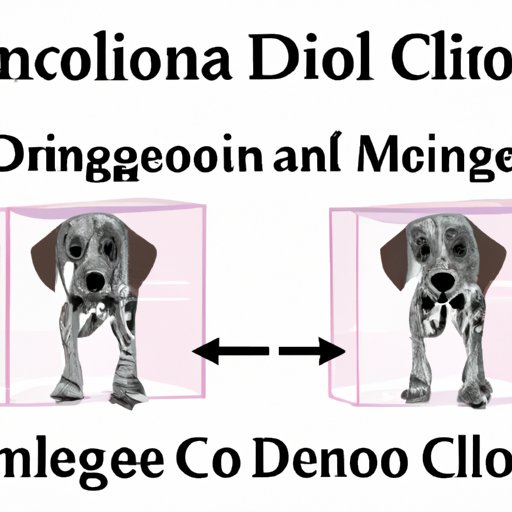
Introduction
As the bond between humans and pets continues to grow stronger, it’s no surprise that people want to hang onto their furry friends for as long as possible. For some, this means investigating ways to clone their pets – a process that’s both fascinating and controversial. In this article, we’ll discuss the ethics and science of cloning dogs, examine the costs involved, and explore whether or not it’s worth it. We’ll also cover the pros and cons of dog cloning, take a lighthearted look at famous cloned dogs throughout history, and provide suggestions for alternatives to cloning for preserving your pet’s memory.
The Ethics and Science behind Cloning Dogs
Cloning dogs might sound like something straight out of science fiction, but the first cloned dog, Snuppy, was born in South Korea in 2005. Since then, the science of cloning has improved considerably, with more and more people looking to replicate their pets. The process begins by taking a small biopsy from the original dog, typically a tissue sample from the ear or abdomen. From there, the genetic material is inserted into an egg from a donor dog, which has had its genetic material removed. The resulting embryo is then implanted into a surrogate mother dog.
While the science of cloning has advanced in recent years, there are still many ethical questions surrounding the process. Some people argue that cloning is an unnatural and unnecessary way of extending a pet’s lifespan, while others claim that it’s a way to preserve the memory of a beloved animal. Additionally, there are concerns about the welfare of the surrogate mother dog, who is put through a highly invasive and risky procedure. Overall, the ethics and science of cloning remain a complex and contentious issue.
Understanding the Cost of Dog Cloning and Whether it’s Worth it
If you’re considering cloning your dog, it’s important to understand the financial cost involved. As of 2021, the cost of cloning a dog varies widely, with some companies charging as much as $100,000 per clone. It’s also important to note that in most cases, the process takes several months and there’s no guarantee that the cloned dog will be identical to the original. In light of these factors, it’s worth asking whether or not cloning is really worth the expense.
For some pet owners, the cost of cloning is a small price to pay for the chance to have their beloved pet back in their lives. Others argue that the money would be better spent on other forms of animal welfare or on improving the lives of existing pets. Ultimately, the decision to clone a dog is a personal one, and it’s up to each pet owner to weigh the pros and cons and decide what’s right for them.
The Benefits and Drawbacks of Cloning Your Dog
Cloning a dog can be a complicated and emotionally fraught decision. While there are certainly benefits to replicating a beloved pet – such as the opportunity to extend their life and rediscover the joy they brought to your life – there are also drawbacks to consider. For one thing, many people worry about the health risks associated with cloned pets. Cloned animals are at higher risk for certain illnesses and health problems, and there’s no guarantee that a cloned dog will be as healthy as the original.
In addition to health concerns, cloning a dog can also raise significant emotional issues. Some people worry that they won’t be able to bond with a cloned pet in the same way that they did with the original. Others worry that the process of cloning is disrespectful to the memory of the original pet or that it’s unfair to the surrogate mother dog. Ultimately, the decision to clone a dog should be an informed one, made after careful consideration of all the potential benefits and drawbacks.
From Spots to Fido: A Look at Famous Cloned Dogs
Despite the controversy surrounding the process, there have been several famous cloned dogs throughout history. Snuppy, the first-ever cloned dog, made headlines in 2005, and since then, other dogs have been cloned for various reasons. CopyCat, a tabby cat, was famously cloned in 2001 by a Texas-based company. In China, researchers have successfully cloned several police dogs, with the aim of creating a more consistent and predictable breed.
While these examples might be fascinating to some, it’s important to remember that cloning remains a complex and controversial process, with many potential drawbacks and uncertainties. The decision to clone a pet should not be made lightly, and it’s crucial to carefully research the process and its implications before moving forward.
Alternatives to Cloning: How to Preserve Your Pet’s Memory Without Replicating Them
If you’re interested in extending the memory of your pet without cloning them, there are plenty of other options to consider. For example, creating a photo album or a scrapbook can be a meaningful and heartfelt way to remember a beloved pet. Commissioning a portrait or a piece of artwork can also be a beautiful way to honor your pet’s memory.
Other options include donating to an animal welfare organization in your pet’s name, volunteering at a local animal shelter, or even fostering another animal in need. These alternatives can be a meaningful way to pay tribute to your pet’s life and to ensure that their memory lives on for years to come.
Conclusion
Cloning a dog is a complex and emotionally charged decision, with many potential benefits and drawbacks. By understanding the science and ethics behind cloning, analyzing the costs involved, and exploring alternatives to cloning, pet owners can make informed decisions that honor their love for their pets. Whether you’re considering cloning your dog or simply looking for ways to extend their memory, there are many different options available. Ultimately, the choice is yours – and it’s one that deserves careful consideration and thought.




